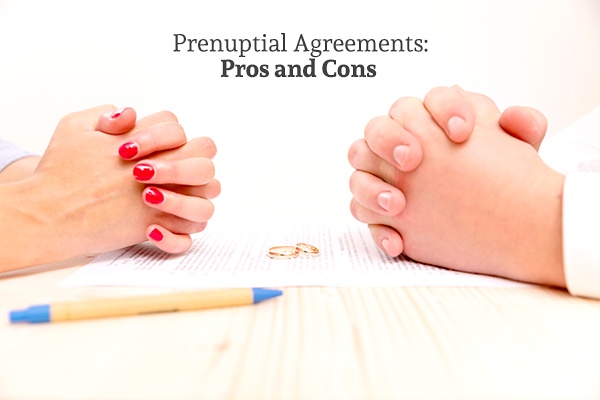Prenuptial Agreement Pros and Cons
 The term prenuptial agreement can produce mixed reactions. Some people don’t like the idea, others think it is wise, and some have never even heard of the term before. If you are on the fence about whether or not a prenuptial agreement is right for you, here are the pros and cons of a prenuptial agreement that you should consider:
The term prenuptial agreement can produce mixed reactions. Some people don’t like the idea, others think it is wise, and some have never even heard of the term before. If you are on the fence about whether or not a prenuptial agreement is right for you, here are the pros and cons of a prenuptial agreement that you should consider:
Prenuptial Agreement Defined
A prenuptial agreement is a contract signed by a couple before they enter into a legal marriage with one another. This agreement discusses the specifics on what would happen in the event that a couple divorces later on down the road. This usually pertains to topics such as property distribution.
Typically, prenuptial agreements are more sought after when one partner already owns their own house or other property. They can also be used to help determine if a partner will be helping to support their family during a period of change, such as when a child goes off to college. Prenuptial agreements should always be done in writing – with the help of a family law attorney – and signed by both parties. If it isn’t, then the agreement may have no standing in a court of law.
Pros of a Prenuptial Agreement
Prenuptial agreements are great for helping a couple save money in the event of a divorce. This is because the division of property is already agreed upon, allowing them to skip the litigation process. Couples can also set up special provisions for events or situations that are unique to them. Finally, a prenuptial agreement can also predetermine the liability for any debt that may be accrued during the couple’s marriage and how it will be handled in the case of a divorce. This can be used as a means of protection for an individual and prevent creditors from going after the wrong person.
Cons of a Prenuptial Agreement
Prenuptial agreements are a great means of protection, but in some cases, they may not be necessary. Some state laws cover the issues that a prenuptial agreement will address, as well as restricting a prenuptial agreement’s power to resolve certain issues such as child support. These states give that kind of power solely to the court system, meaning that a prenuptial agreement will be completely ignored.
Another thing to consider is whether or not a couple’s situation has any of the issues that a prenuptial agreement can address. If a couple is just starting out and does not have any property, a prenuptial agreement may not be applicable to them. Finally, there are some negative emotions associated with a prenuptial agreement. Some people believe that a prenuptial agreement shows a lack of trust between the partners and sets a couple up for divorce and disaster.
No matter what your views are, a prenuptial agreement is something that a couple should be able to decide on for themselves. Every case is different, and if the pros outweigh the cons for your particular situation, then it may be worth looking into. If you and your partner decide that a prenuptial agreement is right for you, contact Alison Grant, Attorney at Law. Her team will help you set up the proper paperwork while also ensuring that both individuals will have their voice heard by the other. This way, you and your partner will be assured that no matter what happens, you both are taken care of.






